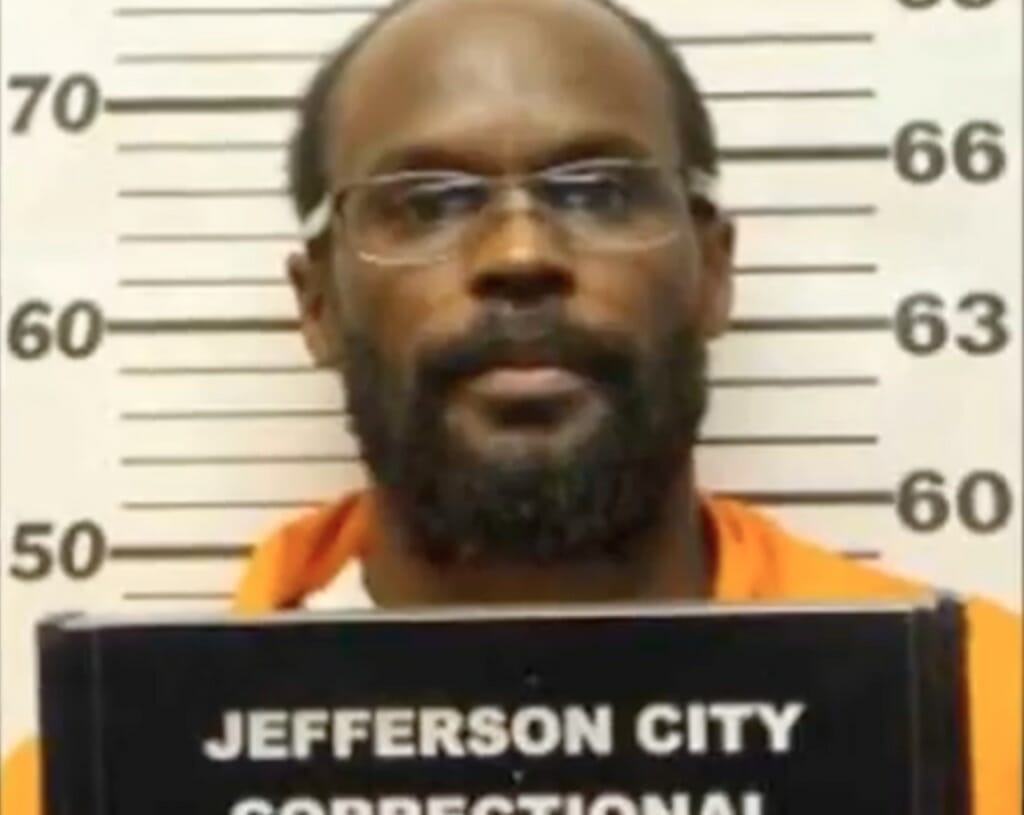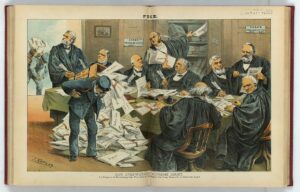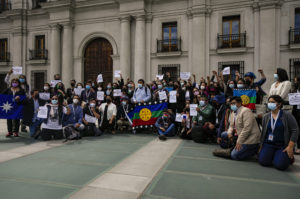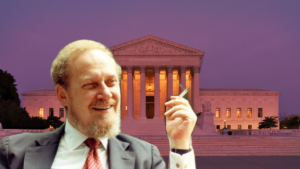Bobby Bostic’s Injustice: A Cruel and Usual Story
As a 16-year-old, he was sentenced to spend the rest of his life in prison for robbery. And the Supreme Court will not review his case to overturn the extreme punishment. Bobby Bostic. (Zevo News / YouTube)
Bobby Bostic. (Zevo News / YouTube)
Bobby Bostic won’t be eligible for parole until he’s 112. He’s more than 20 years into a 241-year sentence for crimes committed in 1995 when he was 16 years old. On Monday, April 23, the Supreme Court announced that it would not review his case. In March of this year, an amicus brief was filed with the Supreme Court on behalf of Bostic hoping to overturn the extreme sentence. The brief cited the 2010 Supreme Court ruling Graham vs. Florida which stated that the Eighth Amendment to the Constitution prohibits a juvenile from serving a life sentence without parole if they did not commit a homicide.
That’s right. He didn’t kill anyone. He didn’t rape anyone either. Bostic and his 18-year-old friend Donald Hutson robbed six people. They then kidnapped one woman, robbed her and let her go. During the robbery, a gun was fired and grazed two people—no one was seriously injured. For reference, a 1995 Department of Justice report shows that the average sentence for homicide was 149 months, or almost 12.5 years. The average time served for homicide was 71 months, or almost 6 years. The average sentence for rape was 117 months, or 9.75 years. The average time served for rape was 65 months or almost 5.5 years. The average sentence for kidnapping was 104 months or just over 8.5 years. The average time served for kidnapping was 52 months, or almost 4.5 years. The average sentence for robbery was 95 months or almost 8 years. The average time served for robbery was 44 months or just over 3.5 years. In other words, compared to those who also committed crimes in 1995, Bostic will spend more time in prison than those convicted of rape and murder.
Donald Hutson, Bostic’s 18-year-old friend will be out in less than a decade. He opted for a plea deal. Bostic, however, decided to go to trial. He was found guilty and convicted on eight counts of armed criminal action, three counts of attempted robbery, two counts of assault, one count of kidnapping, and one count of possession of marijuana. Judge Evelyn Baker sentenced him saying, “You made your choice. You’re gonna have to live with your choice, and you’re gonna die with your choice because, Bobby Bostic, you will die in the Department of Corrections.” Incidentally, she may as well have been talking about his damning choice to go to trial as well as his choice to commit robbery.
The U.S. court system is backed up beyond belief. Plea bargaining relieves the courts by dealing out sentences once the defendant pleads guilty, avoiding the entire trial process. The Supreme Court ruled plea bargaining constitutional in 1970 and since then it’s become the overused cornerstone of a very lopsided and congested system. According to the U.S. Sentencing Commission, over 97 percent of convictions in the federal system, and 95 percent of convictions in the state systems arise from guilty pleas. Predominantly poor and black defendants are often coerced by legal counsels to skip the trial process and just accept a plea deal. Even if they’re innocent, many plead guilty—a concern noted in the Supreme Court’s ruling on plea bargaining. The trial path just isn’t worth it for many—for several reasons. Thanks in no small part to the War on Drugs, there aren’t enough trial times for those accused of a crime—but in the private prison industry, there’s always room for more bodies. The system therefore makes it less appealing to go the trial route because exercising your constitutional right only gums up the system more. Those who are innocent may fear that by just pleading guilty and accepting the plea deal, they’ll end up in prison for no reason. But the poor who can’t afford bail will still face months or even years in jail awaiting a trial whose outcome will be horribly skewed along race lines. And for most, that just doesn’t seem like a worthwhile risk to take. Furthermore, sentences handed down in trial proceedings are often times much more severe than those handed out in plea bargaining. Bostic and Hutson both committed the crimes together. Bostic was 16, Hutson was 18. And yet Bostic’s sentence is eight times longer than his friend’s.
Far from unusual, this case is one of many that suffer from what’s known as a “trial penalty.” Defendants who choose to go to trial risk arbitrary decisions like blocking certain evidence from admission as well as penalties that do not match the severity of their crimes. In 2013, Human Rights Watch released a studyshowing that, on average, the federal drug sentence for defendants who went to trial in 2012 was three times, or 10 years longer than for defendants who pleaded guilty.
Bostic’s story is cruel and usual. Yes, he is guilty. That’s not up for debate. What’s up for debate is whether a 16-year-old boy deserves to spend his entire life in prison for robbery. Even Evelyn Baker, the judge who sentenced Bostic now regrets her decision writing in an op-ed piece, “I see now that this kind of sentence is as benighted as it is unjust. But Missouri and a handful of other states still allow such sentences.”
And many officials stand by those sentences. Missouri Attorney General Josh Hawley applauded the Supreme Court’s decision to not review Bostic’s case, stating that the 2010 Supreme Court case didn’t apply to Bostic who “received multiple sentences, corresponding to the number and severity of his crimes, with an opportunity for parole in extreme old age.” For reference, Hawley is the same bigot who blames the women’s liberation movement for today’s exploitation of women, including sex trafficking. Hawley is currently running for State Senator. If he wins, he’ll join the ranks of dozens who take no issue with the current status of our “justice” system. He’ll be in the company of millionaires and billionaires who accept bribes from other millionaires and billionaires to keep the status quo going—to keep the prisons full and the promise of rehabilitation empty. He’ll sit amongst those who hold fundraising dinners where robber barons clink glasses, and murderers congratulate each other on F-35 contracts.
And while we may sit here and think that Hawley’s an asshole and weapons contractors are evil—if only because Star Wars also thinks so—the American psyche doesn’t mind locking up a poor black kid for life. Racism and capitalism have programmed us to not feel so shocked by stories like this one. As Matt Taibbi writes in his book “The Divide,” “We have a profound hatred of the weak and the poor, and a corresponding groveling terror before the rich and successful, and we’re building a bureaucracy to match those feelings.” In fact, it’s already built. And every day, it demolishes the lives of the poor and marginalized, while pedestaling those of the rich and well-connected. The fight for justice isn’t simply a fight to free and rehabilitate people like Bostic.
It’s not just about upholding a 200-year-old Constitution or using common sense to consider the sentencing of a kid. It’s about rewiring our minds—dissecting the root causes of our injustice system and how we’re going to fight and build together. It’s about building those alternatives to police and prisons. It’s about making the cruel and usual actually cruel and unusual. It’s about addressing the apathy we feel after we close this tab on our computer. It’s about questioning our comfort—our inaction in the face of heinous systemic crimes. Capitalism crushes empathy, collaboration and solidarity. So it is precisely these tools we will need to re-learn how to use in order to address all the ills that both capitalism and racism have wrought. If you find yourself reading about Bostic and thinking, “but he did commit a crime,” that’s a good place to start sharpening those tools.
Your support matters…Independent journalism is under threat and overshadowed by heavily funded mainstream media.
You can help level the playing field. Become a member.
Your tax-deductible contribution keeps us digging beneath the headlines to give you thought-provoking, investigative reporting and analysis that unearths what's really happening- without compromise.
Give today to support our courageous, independent journalists.






You need to be a supporter to comment.
There are currently no responses to this article.
Be the first to respond.